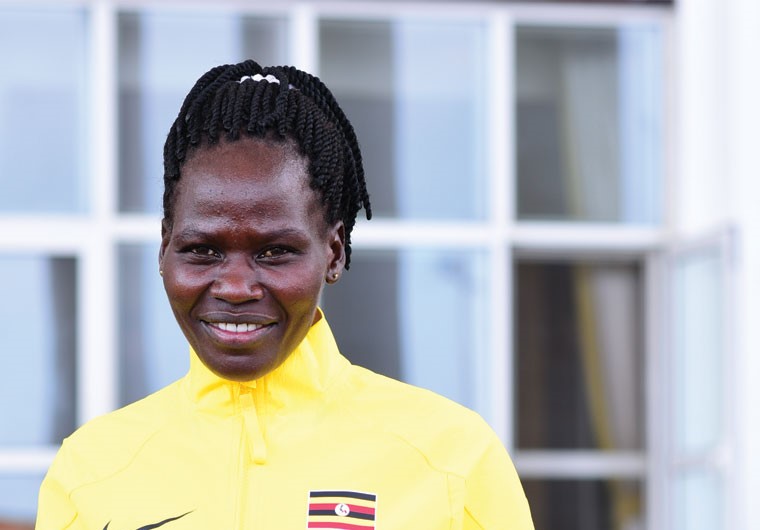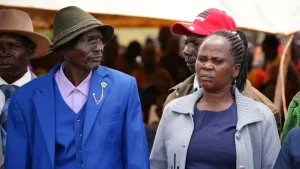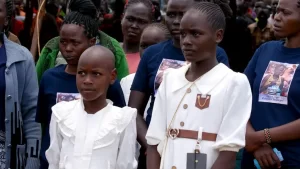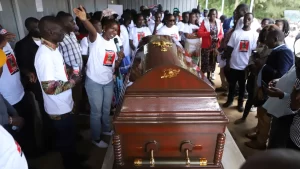Thousands mourn Ugandan Olympian killed by ex-partner
3 min read

In eastern Uganda, thousands gathered to pay their respects to Olympic marathon runner Rebecca Cheptegei, who tragically lost her life after being set on fire by her ex-boyfriend. The attack occurred just under two weeks ago outside her home in north-west Kenya, where Cheptegei was training. The incident, marked by its shocking brutality, has devastated her family and captured global attention, highlighting the pervasive issue of violence against women in Kenya.
Cheptegei’s former partner, Dickson Ndiema, doused her in petrol and ignited it, leading to her suffering burns on over 80% of her body. She succumbed to her injuries four days later in the hospital, where doctors reported that the severe burns caused multi-organ failure. Ndiema, who was also burned in the attack, died a week later from his injuries.

The funeral took place in Bukwo, Cheptegei’s home district, where a sea of mourners, including fellow athletes clad in black T-shirts bearing the message “Say No to Gender-Based Violence,” attended. Kenya’s Sports and Youth Affairs Minister Kipchumba Murkomen expressed deep regret, acknowledging the failures of both government and community in addressing the issues that led to Cheptegei’s death. He lamented the lack of awareness and intervention in the local community regarding her personal struggles.
Cheptegei and Ndiema had reportedly been in conflict over a piece of land, a dispute that appears to have escalated into the horrific attack. The somber ceremony saw local leaders paying tribute to Cheptegei, highlighting her dedication and inspirational role in athletics. A memorial service was held with her coffin draped in the Ugandan flag, and a moment of silence was observed. Plans are underway to honor her memory by naming a road and a sports venue after her.

Stella Chesang, a teammate who competed alongside Cheptegei at the Paris Olympics, shared her grief. “It is really a sad moment in Uganda… and all of us friends,” she said. Cheptegei’s final race was the marathon at the Paris Olympics, where she finished 44th. Despite this, she was celebrated as a “champion” in her home area. Her achievements include winning gold at the World Mountain and Trail Running Championships in 2022.
Before her funeral, Cheptegei’s coffin was viewed by family, friends, and activists at a funeral home in Eldoret, Kenya. Her mother, Agnes Cheptegei, was seen mourning deeply, holding a souvenir bag from the recent Olympics and wearing a T-shirt that read “Being a woman should not be a death sentence.”
Cheptegei’s death marks the third instance in three years of a female athlete being killed in Kenya by a current or former romantic partner. The previous victims include world-record holder Agnes Tirop, who was stabbed to death in 2021, and Damaris Mutua, who was strangled six months later. These incidents underscore a broader and troubling trend of violence against women in the country.

Joan Chelimo, co-founder of Tirop’s Angels, a group focused on combating violence against women, noted that female athletes are increasingly targeted due to their challenge to traditional gender norms. “They are becoming more independent, financially secure, and this threatens established gender roles,” Chelimo said.
Rachel Kamweru, spokesperson for Kenya’s government department for gender and affirmative action, emphasized the need to address this crisis. “We don’t want this to happen to any other woman, whether an athlete or a young girl from a village,” she stated.
Rebecca Cheptegei’s journey began when she joined the Uganda People’s Defence Forces in 2008, which supported her athletic career. Despite her untimely death, her legacy as a champion remains strong. Her story brings to light the urgent need for greater protection and support for women, particularly in contexts where they challenge societal expectations.